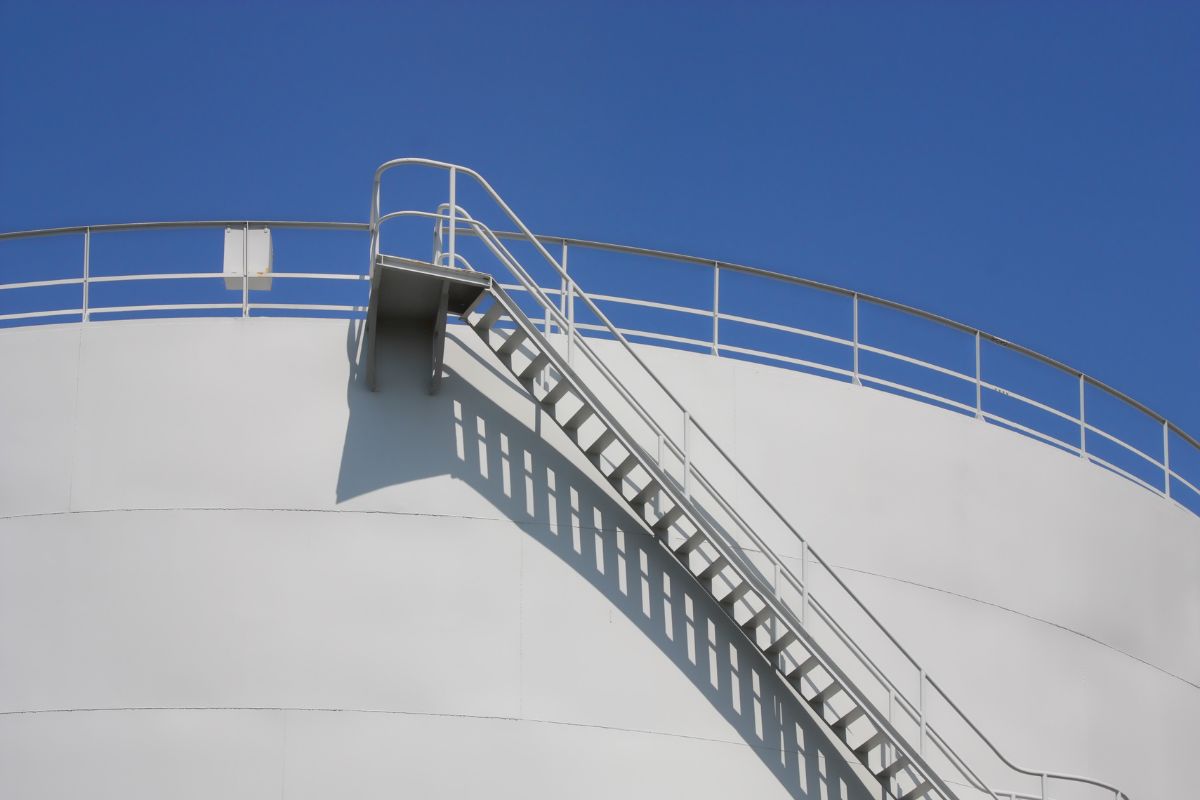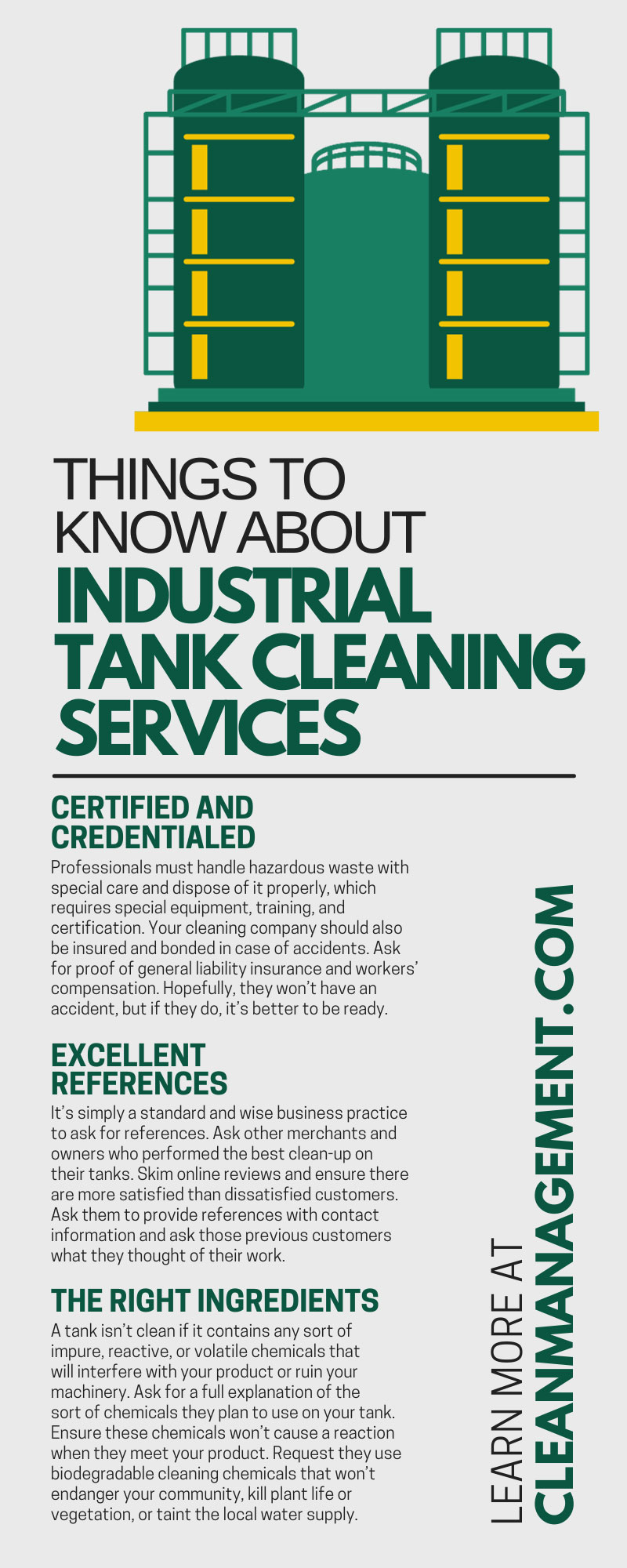7 Things To Know About Industrial Tank Cleaning Services

If your business uses industrial tanks, there’ll come a time to empty them out and give them a thorough cleaning. It’s a dirty job, as the saying goes, but someone has to do it. After all, you need to ensure efficiency, protect product purity, and/or meet assorted rules and standards set forth by the government, industry, and yourself. Regularly scheduled cleanings also help the tank last longer and prevent spills, leaks, explosions, and more. But before you think you can just jump into the tank with a bucket of soapy water and a few rags yourself, seriously consider hiring a professional cleaning company. Read on to explore seven things to know about industrial tank cleaning services and how they can keep your tanks clean and your business thriving.
Check It Out
You should already subject your tanks to regularly scheduled inspections. Generally, it is best to have a professional inspect the tanks every five years or so, though this frequency can vary according to the tank’s use and contents. In the meantime, keep tabs on them yourself. Watch for leaks, rust spots, cracks, and similar damage and weaknesses. See if the tank’s support structure is in danger of failing or otherwise faltering. If necessary, make sure the tank has proper ventilation while also ensuring there’s no way for water, dust, vermin, and the like to get inside.
Visually inspect the interior to see if there’s any build-up of whatever product it contains, making sure the contents do not block the chutes, pipes, and the like. Note any suspicious odors or the presence of algae or other organisms, and test the contents regularly for impurities, pH levels, high or low temperatures, or other changes. Some of these issues might require the services of another professional to repair. Note scheduled inspections on the calendar and inform employees about what to look for between these professional inspections.
Does It Need Cleaning Yet?
After you contact the cleaning service, they’ll ask you a few questions about your tank. Naturally, they’ll ask what sort of tank it is and what it contains. Some tanks need more frequent cleanings. Water tanks require biannual cleanings to ensure the water is clean, pure, and free from microorganisms. Tanks containing food products may require more frequent cleaning, while industrial tanks that contain more hazardous materials may have a specific schedule based on OSHA or other standards. Your cleaner can help you understand what your particular tanks require.
Necessary Knowledge
When you hire a cleaning company, inquire as to whether they have the equipment and materials needed to do a safe and thorough job. This isn’t a matter of hosing down the interior walls with a pressure washer and leaving it at that. Cleaners need to know what the materials in tanks can do. They should outline the potential issues and dangers of working in the tanks and initiate safety protocols to prevent emergencies, injuries, or deaths. If they don’t seem to know what they’re talking about, don’t hire them.
Certified and Credentialed
If tank cleaning was as easy as cleaning your house, you and your employees could do it yourselves—but it’s not. Once you determine that a potential cleaning company has the knowledge to clean up your tanks and their messes, ask them to back it up. The best and most trusted companies have received credentials and certifications in performing the job and handling specific kinds of waste. Professionals must handle hazardous waste with special care and dispose of it properly, which requires special equipment, training, and certification. Your cleaning company should also be insured and bonded in case of accidents. Ask for proof of general liability insurance and workers’ compensation. Hopefully, they won’t have an accident, but if they do, it’s better to be ready. Additionally, you will want to ask them what they plan to do in case of an accident. Their swift and accurate answer should inspire confidence.
Excellent References
It’s simply a standard and wise business practice to ask for references. Ask other merchants and owners who performed the best clean-up on their tanks. Skim online reviews and ensure there are more satisfied than dissatisfied customers. Ask them to provide references with contact information and ask those previous customers what they thought of their work. Finally, go with your gut. If they give you the hard sell, are sketchy about their methods, or otherwise raise red flags, don’t hire them. Whatever you save on a low-cost cleaning won’t be worth it if there are major issues down the line as a result. And make sure you have a contract; do not make handshake deals.
The Right Ingredients
A tank isn’t clean if it contains any sort of impure, reactive, or volatile chemicals that will interfere with your product or ruin your machinery. Ask for a full explanation of the sort of chemicals they plan to use on your tank. Ensure these chemicals won’t cause a reaction when they meet your product. Request they use biodegradable cleaning chemicals that won’t endanger your community, kill plant life or vegetation, or taint the local water supply.
Schedule and Budget
Finally, the last thing to know about industrial tank cleaning services is that your budget is equally as important as your timeframe. In general, this is not a service you want to get too cheaply. A thorough cleaning should be worth the expense, so don’t always go with the lowest bidder. Scheduling, of course, is also paramount. Typically, an industrial tank cleaning can take anywhere from two to four days, but it depends on the size of the tank, its contents, and other considerations. If you are cleaning the tanks in anticipation of an inspection, schedule accordingly. Of course, remember the tanks will be out of commission during the cleaning and perhaps a little bit after if you plan to do any maintenance. Don’t lose time and money on a tank that’s out of commission for weeks.
If you have any major industrial cleaning projects or waste disposal issues in San Antonio, contact us for a consultation! We look forward to hearing from you soon.

